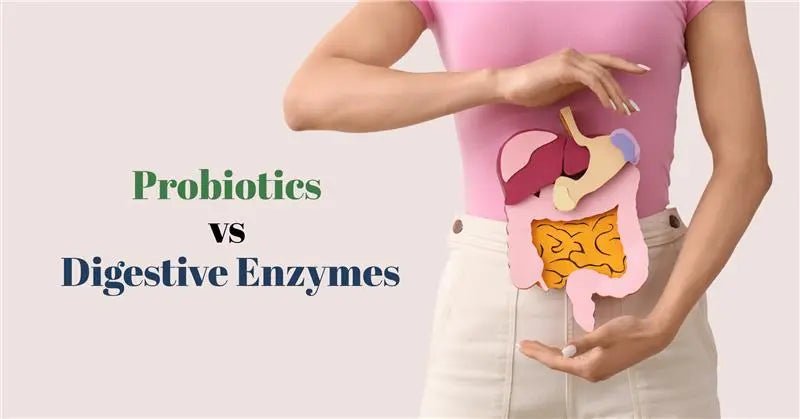If you often experience bloating, indigestion, or irregular bowel movements, you’ve probably heard health experts recommending probiotics or digestive enzymes.
Both are popular for supporting gut health, but they work in different ways.
So, what’s the difference between probiotics and digestive enzymes? And which one does your body actually need?
Why Gut Health Matters More Than You Think?
Your gut isn’t just about digestion; it’s often called your second brain. That’s because more than 70% of your immune system resides in the gut, and it communicates directly with the gut–brain axis.
This is where probiotics and digestive enzymes come into play. Both help your gut to work better, and while they support it in different ways, they often work best together.
When your gut is healthy:
- You digest food efficiently.
- You have fewer stomach issues.
- Your skin looks clearer.
- You feel more energetic and focused.
But when gut it’s not healthy, you might experience:
-
Gas and bloating
-
Constipation or loose stools
-
Fatigue and brain fog
-
Skin issues (acne, dullness)
-
Weak immunity
What are Probiotics?
Probiotics are beneficial bacteria that naturally live in your gut. They help keep harmful bacteria under control and support your immune system. Think of your gut like a city, probiotics are the good citizens who keep everything organised and running smoothly.
What are Digestive Enzymes?
Digestive enzymes are natural proteins produced by your body to break down food into nutrients that can be absorbed. If your body does not produce enough enzymes, food may not be digested properly, leading to gas and a feeling of heaviness after meals.
Let’s understand more about different types of enzymes:
|
Enzyme |
What It Breaks Down |
Found In |
|
Amylase |
Carbohydrates (starches, sugars) |
Saliva, pancreas |
|
Protease |
Proteins (meat, eggs) |
Stomach, pancreas |
|
Lipase |
Fats (oils, butter) |
Pancreas |
|
Lactase |
Lactose (milk sugar) |
Small intestine |
|
Cellulase |
Plant fiber |
Gut bacteria, supplements |
According to research in Digestive Diseases and Sciences (2020), enzyme supplements can significantly reduce digestive discomfort, especially after heavy or high-fat meals.
Signs You Might Need Probiotics
If your gut bacteria are out of balance (a condition called dysbiosis), your body will show signs like:
-
Frequent bloating or gas
-
Constipation or diarrhoea
-
Food intolerances
-
Low immunity or frequent colds
-
Acne or dull skin
-
Brain fog or mood swings
Signs You Might Need Digestive Enzymes
On the other hand, if your body doesn’t produce enough digestive enzymes, you may experience:
-
Feeling full or heavy even after small meals
-
Bloating shortly after eating
-
Floating or greasy stools (sign of fat not being digested)
-
Heartburn or indigestion
-
Nutrient deficiencies (low B12, iron, etc.)
Can you take probiotics and digestive enzymes together?
Yes, in fact, they work beautifully together, complementing each other like teammates. Digestive enzymes help break down food more efficiently, making nutrients easier to absorb.
Probiotics supplements then start their role by feeding on these nutrients to grow and maintain a healthy gut ecosystem. Together, they can help you digest food more effectively and may also reduce gas and bloating.
Also Read: The Best Probiotic Supplements For 2025 And Know How to Choose Best Probiotic Capsules
Probiotics vs Digestive Enzymes: Which One Works Better?
|
Concern |
Best Choice |
Why |
|
Bloating, constipation, or IBS |
Probiotics |
They rebalance gut flora and improve stool consistency |
|
Slow digestion or heaviness after meals |
Digestive Enzymes |
Help break down carbs, fats, and proteins quickly |
|
Post-antibiotic recovery |
Probiotics |
Replenish good bacteria lost during medication |
|
Nutrient absorption issues |
Digestive Enzymes |
Enhance nutrient breakdown and absorption |
|
Overall gut health and immunity |
Probiotics |
Long-term balance and gut protection |
|
Fatty or protein-heavy diets |
Digestive Enzymes |
Support enzyme activity for proper digestion |
When And How To Take Probiotics?
To get the most from your probiotic supplement, take one capsule every day, preferably on an empty stomach or before meals. Probiotics need water to activate in your gut, so always stay hydrated. Store them properly in a cool, dry place. Consistency is key, as it takes a few weeks for probiotics to colonise your gut.
Foods That Naturally Support Gut Health
|
Probiotic-Rich Foods |
Enzyme-Rich Foods |
|
Yoghurt with live cultures |
Pineapple (contains bromelain) |
|
Kefir |
Papaya (contains papain) |
|
Kimchi |
Kiwi |
|
Sauerkraut |
Mango |
|
Miso |
Banana |
|
Kombucha |
Avocado |
Common Myths About Gut Health
|
Myth |
Truth |
|
“Probiotics work instantly.” |
It can take 2–4 weeks to see noticeable changes. |
|
“You can get enough probiotics from food alone.” |
Foods help, but supplements ensure effective amounts. |
|
“Enzymes and probiotics do the same thing.” |
They have completely different roles, so both are important. |
|
“Only people with stomach problems need them.” |
Everyone benefits from a healthy gut, even if you feel fine. |
Signs Your Gut Health Is Improving
You’ll know your gut is healing when you notice:
- Less bloating after meals
- Regular, easy bowel movements
- More energy and clearer skin
- Better mood and focus
- Stronger immunity
How Long Does It Take To Take Probiotics And Enzymes?
Probiotics should be taken daily for at least three months to restore gut balance. Many people continue for long-term ongoing health benefits. Digestive enzymes should be used as needed, especially before heavy or processed meals. The key is consistency; your gut doesn’t heal overnight; it takes steady care.
Conclusion
Your gut is at the heart of your overall health. When it’s balanced, everything else, from digestion to skin to mood, functions better.
Both probiotics and digestive enzymes matter: digestive enzymes help your body break down food properly, while probiotics keep your gut flora balanced and support your immune system.
For long-term results, start with a high-quality probiotic formulated to restore your gut’s natural balance and improve digestion. Remember: when your gut is happy, your whole body thrives.

